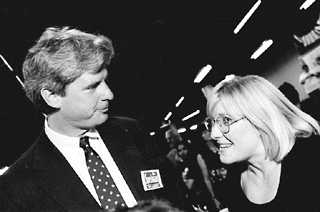Place 5: Man O' Manny
Election '97 Coverage
By Amy Smith, Fri., May 9, 1997
|
|
Within minutes after Ronney Reynolds ceded the mayor's race to Kirk Watson on Monday, campaign leaders for council candidate Bill Spelman hustled to put a favorable spin on how the latest news will affect the outcome of the Place 5 runoff.
"I wouldn't say we're pleased or displeased," said Mike Blizzard, campaign manager for Spelman, who finished second behind Manuel Zuniga in last Saturday's election. "It changes the nature of the game for us, and it also opens up some contributions that would have gone to [mayor-elect] Watson." Understandably, there are some serious Spelman concerns figuring into this newfangled scenario, too. What if the voters who turned out for Watson don't bother going to the polls May 31, now that their man is in the mayor's seat? Presumably, they were the same like-minded progressive/environmental folks who gave 28% of the vote to Spelman, a UT associate professor. And what if Reynolds' big financial backers enrich Zuniga's coffers further as a means of insuring the homebuilder's victory on judgment day? On the latter, Alan Glen, a development lawyer and president of the Real Estate Council of Austin, isn't so sure that will be the case.
"I don't see that there will be a huge amount of money for those [Place 5 and Place 6] races just because Ronney is not there," Glen said. While there was additional money earmarked for Reynolds in the runoff, he added, "I don't know if that now translates into a dramatically proportionate increase in the other races."
Aside from financial matters, Spelman will have to work harder to woo Watson's constituency. "The change in the mayor's race presents a real challenge for us," Blizzard acknowledged, "but I'm happy that Bill will have the opportunity to define himself as a candidate without the perception that he's riding on [Watson's] coattails."
As Spelman sees it, the dividing line between himself and Zuniga is simple. "I'm concerned about public safety and neighborhoods, and about growth and planning issues as they relate to 20,000 people moving to Austin each year," he said. "Manuel Zuniga's income depends on that growth."
Zuniga, who swung 43% of the vote, entered the primary on the real estate-friendly slate that was hobbled first by Becky Motal's unsuccessful bid for Place 2 and then by Reynolds' sudden decision to walk. Moreover, Councilmember Eric Mitchell didn't capture enough votes to secure an outright win, and now faces Willie Lewis in a Place 6 runoff.
Zuniga, meanwhile, took steps Monday to sever at least one line of communication to the outside world. He called Monday to say he wouldn't be returning any more Chronicle phone calls. The Chronicle's mission, he concluded, is to "make me look bad." Click.
Thin skin aside, Zuniga showed his greatest strength in North Austin, where residents gave him 54.1% to Spelman's 21.9%. And East Austin, largely representative of Hispanic and African-American voters, looked kindly on Zuniga, too, giving him a 35.7% plurality. The East Austin take was a feather in Zuniga's cap. He has said all along that the Place 5 seat should be filled by a Hispanic councilmember -- a tradition to which many Latino residents hold fast. The Hispanic seat factor presents a formidable hurdle for the Spelman camp to clear if they expect to snag support from voters who went with liberal Hispanic candidates Bobbie Enriquez and Gus Peña.
Eastside activist Suzanna Almanza, a leader in People Organized for Defense of Earth and Her Resources (PODER), said she expected to meet with Zuniga earlier this week to discuss the candidate's stand on PODER issues. Almanza supported Pena in the first go-around, and said she feels strongly about reserving the Place 5 seat for a Hispanic.
Acknowledging Zuniga's conservative bent, Almanza reasoned: "Just because he has money doesn't mean he doesn't have a conscience. [Zuniga] worked his way up; he wasn't born rich. We want someone who is concerned about people of color and people east of I-35. We have a lot of liberal candidates who don't care about East Austin," she said.
Both Enriquez and Peña also argued that the seat should remain a Hispanic voice, although both candidates are more closely aligned with Spelman's progressive views than with Zuniga's fiscally conservative agenda. Karen Hadden, who finished an impressive third with 12.2% of the vote, has already thrown her support behind Spelman. It was uncertain at press time which way Enriquez or Peña will go.
For her part in the contest, Enriquez enjoyed a fair amount of endorsements on the campaign trail but squeaked, nevertheless, into fourth place with just under 10% of the overall vote, followed by Peña's 6.8%. At about 8pm last Saturday, Enriquez sank wearily into the love seat at her campaign headquarters -- the historic Richard Moya home in East Austin -- and didn't try to hide the look of heavy defeat settling across her face. Even with only 1% of the votes counted, Enriquez' dark eyes told the story: It's all over. "I was really naïve going into this," sighed the first-time candidate, whom many believe was pushed unprepared and underfunded into the race to thwart Zuniga's candidacy.
Clearly, the lack of support in the progressive community stunned Enriquez. After the election, she packed a bag and left for San Patricio County for a wound-licking couple of days spent with friends. "We thought her numbers were going to be a lot higher," said campaign manager Manuel Medina of the dismal showing. "She laid out a progressive agenda but didn't get any progressive votes." Should she decide to make an endorsement in the runoff, he said, Enriquez will need to ask some tough questions. "The question is," Medina said, "does she choose a Hispanic or an Anglo -- development or S.O.S. -- to work for community issues?"
At the other end of the emotional spectrum, third-place winner Hadden -- an activist's activist -- was effusively upbeat after the election. She pulled in considerable Central Austin support, too, with her promise to work toward repealing the bicycle helmet ordinance. Perhaps more than any other candidate, Hadden proved that campaigns can run effectively on a shoe-string budget (mindful of campaign finance-reform efforts) and the energy of plain old grassroots enthusiasm. Expect to see Hadden back again.
Got something to say on the subject? Send a letter to the editor.









